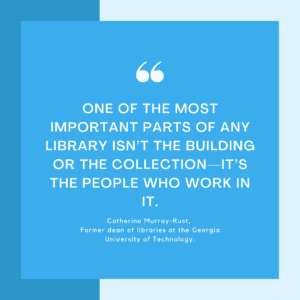The Future of Library Work and Digitalization
Moving from analog to digital is changing everything in our lives, like the economy, society, education, culture, and politics. This blog explores how digital transformation is reshaping the future of library work.
Digital Transformation: A Widespread Phenomenon
Digital transformation is not just affecting libraries; it has been a significant focus in the corporate world for years. Before the pandemic, many organizations, including libraries, hesitated to fully embrace digital transformation, fearing disruption. However, the sudden shift to remote work accelerated the need for widespread digital adoption, leading to the rise of:
- Video-conferencing
- E-learning
- Streaming services
- Long-distance collaboration
- Telemedicine
- Various other electronic/digital products and services
Digitalization: Drivers and Enablers
Digital transformation involves reimagining business models through modern information and computer technology. It requires organizations to adapt their culture, management strategies, technology, and operations, always keeping the client at the center.
Enablers of Digital Transformation:
- Significant increase in IT processing power
- Automation and robotics to improve communication speed
- The advent of augmented, virtual, and mixed-reality technologies
- Machine learning and AI
- Big Data Analytics
- Effective visualizations
Drivers of Digital Transformation:
- Heightened competition
- Financial pressures
- User expectations
- The “new normal” post-COVID-19
However, technology alone isn’t enough to drive significant change. Organizations need dedicated management, a clear vision, and innovative leadership. Updated business models must leverage new IT solutions and existing knowledge to fundamentally transform organizational culture, management strategies, technology, and operations. This approach seeks new revenue streams, products, and services.
The Future of Library Work
Digital transformation raises essential questions about the future of libraries. Historically, libraries defined themselves by their physical locations, collections, catalogs, and staff who assisted visitors. However, the advent of computers has challenged nearly every aspect of this traditional model. Today, there are online libraries with lots of electronic files, new ways to find information, and fewer staff in libraries.
Different perspectives on the future of libraries include:
- Minimalists: Believe libraries are well-developed and need few changes.
- Moderates: Advocate for incremental, progressive changes while maintaining the essence of modern libraries.
- Radicals: Predict significant changes, envisioning highly automated libraries managed by AI, offering advanced text comprehension and idea aggregation.
- Extremists: Foresee the complete disappearance of traditional libraries, replaced by intelligent machines with quantum computing power, capable of handling vast amounts of information and generating new ideas.
Digitalization and the Future of Library Work
Future iterations of AI-powered virtual assistants like Amazon Alexa, Apple Siri, Google Assistant, and Baidu Duer will further influence our lives and the operation of libraries.
Agility in Operation: Libraries must adapt their operations, technology, and information to changing business requirements driven by digital transformation. They should identify opportunities and threats, promote multidisciplinary collaboration, plan regular development work, and foster innovation.
Customer-Centricity: Libraries have always prioritized excellent customer service. Digital transformation enhances this focus, enabling library professionals to better meet future demands. Key needs include:
- High-quality communication and listening skills
- Patron-focused venues
- Personalized customer service methods
- Customer satisfaction monitoring
- Appropriate metrics
The goal is to provide an exceptional experience while building long-term partnerships.
Workforce Competencies: Technology often outpaces traditional workplace arrangements. Digital transformation requires new skills, including:
- Technical knowledge and digital literacy
- Dedication and adaptability
- Overcoming information overload
- Personal growth and lifelong learning
- Social and emotional intelligence
- Cultural awareness
- Multidisciplinary approaches
- Remote work capabilities
- Understanding generational differences
- Advanced digital ethics
The World Economic Forum believes that technology can assist employees by handling data processing and information searches. This could impact traditional library jobs that primarily involve these tasks.
Recent Research and Discussions on the Future of Libraries
Recent studies have highlighted significant trends in the evolving landscape of libraries, driven by technological advancements, changing patron expectations, and external factors like the COVID-19 pandemic. Three key trends have emerged:
Transition to Digital Services and Delivery Models
From FY 2014 to FY 2018, U.S. libraries decreased spending on physical materials by 6% while increasing spending on electronic materials by 31%. The COVID-19 pandemic accelerated this trend, emphasizing the importance of digital resources. Libraries must navigate complex licensing agreements and digitization processes, requiring agile lending platforms to manage these tasks effectively.
Enhancing Patron Experience Through Technology:
Patrons expect more personalized and immediate library services. Research indicates that 66% of customers want organizations to understand their specific needs, and most use various channels for transactions. Libraries are improving digital services, creating versatile spaces for different working styles, and aligning with remote work and digital learning trends.
Achieving Efficiency Amid Budgetary Constraints:
Despite receiving emergency relief aid during the pandemic, many libraries face ongoing budgetary pressures. Automation and AI are vital tools, streamlining workflows and freeing librarians to focus on high-value tasks. Intelligent platforms can handle administrative duties and offer analytics to help libraries make informed decisions about resource allocation. Collaborations with other libraries through resource-sharing networks further optimize budgets and expand access to diverse collections.
Conclusion
The digital revolution will bring extraordinary changes to the world, including the future of library work. While libraries’ 2,700-year history will continue, librarians must learn new skills, enhance teamwork, foster creativity, and encourage innovation. Libraries will remain vital because, as Ray Bradbury said, “Without libraries, what do we have? We have no past and no future.”
“Without libraries, what do we have? We have no past and no future.”
Ray Bradbury







